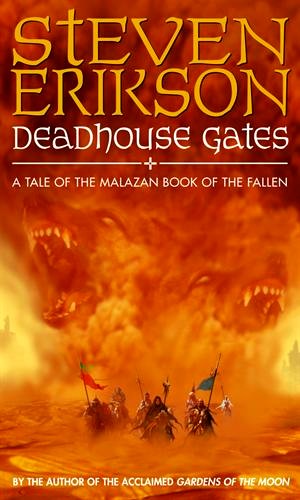
The second novel in the Malazan Book of the Fallen series makes a sharp turn away from the story of the Empire's invasion in Genabackis. The reason - believe it or not - is that Memories of Ice's draft got lost in a computer crash and Erikson was so frustrated, that he wrote an entirely new book before returning to his original storyline. Whatever the reasons, the model of jumping to different storylines between books turned out to be successful, so there's no reason to complain.
Deadhouse Gates is situated in the desert continent of Seven Cities. The birthplace of humanity, and home to the First Empire of man, it was also the first to fall under the expanding Malazan Empire's rule. But now a rebellion rises - the Whirlwind, led by the prophetess Sha'ik who resides in the holy desert of Raraku. As the occupied territories fall one by one, the Seventh Army, under the command of the legendary Malazan Fist Coltaine, begins a daring journey across the continent to get fifty thousand refugees to the safety of the Imperial Seven Cities capital of Aren - a march that will later be known as the Chain of Dogs. Amidst the chaos of the Whirlwind, the ancient and powerful half-Jaghut Icarium travels on the Path of Hands to find clues to a past he does not remember.
Meanwhile the Empire's nobility is being culled by the Empress to prevent the noble families from gaining too much power. Many are killed, but others, like the young Felisin Paran - sister to the Bridgeburners' commander Ganoes and the Empress' Adjunct Tavore - are sent to the mines of Otataral island, to dig for the sorcery-negating substance. The cull sends Felisin on a journey that would change the course of events on the opposite side of the world.
Deadhouse Gates is arguably the best book in the series so far (and considering the significant decline in quality in later installments that is not likely to change). The three intertwining stories of the Chain of Dogs, Icarium's journey and Felisin's adventures create an epic tapestry rich with the ancient history hidden under the sands of Seven Cities, and revelations concerning both the Empire's origins and the bigger powers that play a part in the apocalyptic events of the rebellion. It also marks an amazing improvement in terms of style. Erikson's prose - at times clumsy and clunky in Gardens of the Moon - suddenly blooms into a rich and mature writing that will hold for the next four books, before starting to degenerate into the verbose heaviness of the last few installments.
10/10

While Deadhouse Gates is possibly the most stand-alone part in the series, it is still only a step in the development of the myriad story-lines that are meant to converge at the ending of the series. Thus comes House of Chains, book 4 of the Malazan Book of the Fallen. After the events of the Whirlwind and the Chain of Dogs, the Empire sends Adjunct Tavore Paran and the Fourteenth Army to venture into the heart of Holy Raraku and confront Sha'ik herself.
Meanwhile, from the northern mountains on the continent of Genabackis, a man like no other arrives into the world. Karsa Orlong is Teblor - a race of giants, descended from the legendary ancient Toblakai. He sets on a journey that will change not only his life, but the fate of the entire world.
House of Chains develops both the Seven Cities stories and that of the Crippled God's ascension, after he was introduced in Memories of Ice. Although a lot of important events occur, it is less self-contained than the previous two novels. Erikson's introduction of Karsa is also controversial, because for the first time a single-character story-line takes a quarter of the book without ever switching to a different character.
It is still a solid book though, and closes nicely the Whirlwind line, even if a few loose ends are left for book 6, The Bonehunters. It also introduces the series' most notorious character, and sets the scene for the third and final big story-line of the Malazan Book of the Fallen.
8.5/10
Next: Malazan: The early books - Lether
No comments:
Post a Comment